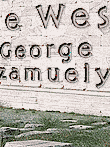In
a number of his pronouncements, Bush has violated the most
fundamental axiom of "neo-conservative" doctrine.
This states that the end of the Cold War was an event of
relatively little significance, since the United States
faces as many perils as it did before – perhaps even more.
From "extreme nationalism" in the Balkans to weapons
of mass destruction in the hands of Iran and Iraq to the
abuse of "human rights" in China to a resurgent
authoritarian Russia, the United States must confront enemies
in every corner of the globe. But Dubya has criticized excessive
US interventionism. He has also said that he opposes what
he calls "nation building." This is very confusing.
For Bush seems to have difficulties naming Clinton Administration’s
initiatives that he objects to. Bombing Yugoslavia – he was
in favor. His only problem with US policy was that it was
not "ferocious enough." Sanctions against Iraq – he
is in favor. His only problem with US policy is, again,
that it is too half-hearted. Intervention in Colombia; bailing
out US bankers in Mexico; bombing pharmaceutical factories
in Sudan; underwriting Israel’s agenda in the Middle East – there
is scarcely any ingredient of the US global program that
Bush opposes. To be sure, like many "neo-conservatives,"
he lists Somalia and Haiti as mistaken interventions. However,
Somalia and Haiti happened a long time ago. Moreover, neither
intervention was terribly important. Besides, the objection
is generally not based on principle. Getting bogged down
in hellholes is every interventionist’s nightmare. It might
turn the public against an imperial foreign policy.
Bush
and Gore are pretty much in agreement on interventionism.
But there are differences. Bush prefers to keep quiet about
his intentions so as not to frighten anyone. And he promises
to cut taxes. In the first debate in Boston, Jim Lehrer
asked the two candidates: "How would you go about as
President deciding when it was in the national interest
to use US force?" Bush responded in straight-down-the-line
Colin Powell terms: "Well, if it’s in our vital national
interest, and that means whether our territory is threatened
or people could be harmed, whether or not the alliances
are – our defense alliances are threatened, whether
or not our friends in the Middle East are threatened. That
would be a time to seriously consider the use of force.
Secondly, whether or not the mission was clear. Whether
or not it was a clear understanding as to what the mission
would be. Thirdly, whether or not we were prepared and trained
to win. Whether or not our forces were of high morale and
high standing and well-equipped. And finally, whether or
not there was an exit strategy."
Talk
like this could be expected to drive "neo-conservatives"
up the wall. Their hatred for Colin Powell is as virulent
as Madeleine Albright’s. In My
American Journey, Colin Powell famously described
the dreadful White House meetings he had had to endure on
the subject of Bosnia. The hideous harridan would repeatedly
call for the bombing of Serbs. "My constant, unwelcome
message at all the meetings on Bosnia," Powell writes,
was simply that we should nor commit military forces until
we had a political objective…..The debate exploded at one
session when Madeleine Albright, our ambassador to the UN,
asked me in frustration, ‘What’s the point of having this
superb military that you’re always talking about if we can’t
use it?’ I thought I would have an aneurysm. American GIs
were not toy soldiers to be moved around on some sort of
global game board." Without doubt, Bill Kristol, Robert
Kagan, Norman Podhoretz, Robert Kaplan would have asked
Powell exactly the same question. Moreover, Al Gore would
appear to be with them. To Jim Lehrer’s question he responded
in an appropriately hectoring "neo-conservative"
tone: "Now, just because we don’t want to get involved
everywhere doesn’t mean we should back off anywhere it comes
up. I disagree with the proposal that maybe only when oil
supplies are at stake that our national security is at risk.
I think that there are situations like in Bosnia or Kosovo
where there’s a genocide, where our national security is
at stake there." For years, these wretched, hysterical
little magazines have tried to persuade us that America’s
"national security is at risk" pretty much whenever
anything happens anywhere that we disapprove of.
Bush
stuck to his almost Buchananite line about the "national
interest" in the second debate at Winston-Salem. Jim
Lehrer asked the two candidates: "One of you is about
to be elected the leader of the single-most powerful nation
in the world, economically, financially, militarily, diplomatically,
you name it. Have you formed any guiding principles for
exercising this enormous power?" Bush’s response: "First
question is what’s in the best interests of the United States?
What’s in the best interests of our people? When it comes
to foreign policy that will be my guiding question. Is it
in our nation’s interests?" Dubya even had the temerity
to add that "if we’re an arrogant nation" people
around the world will "resent us. If we’re a humble
nation, but strong, they’ll welcome us." Lehrer, who
has made it his life’s work religiously to adopt conventional
opinions as his own, was a little dumbfounded. "Should
the fall of Milosevic," he asked Bush, "be seen
as a triumph for US military intervention?" Dubya responded:
"I think it’s a triumph. I thought the President made
the right decision in joining NATO and bombing Serbia. I
supported them when they did so. I called upon the Congress
not to hamstring the Administration." Lehrer probed
further: "But you think it would not have happened – do
you think that Milosevic would not have fallen if the United
States and NATO had not intervened militarily? Is this a
legitimate use of our military power?" Bush responded:
"Yes, I think it is. Absolutely. I don’t think he would
have fallen had we not used the force." Lehrer, of
course, would never dream of asking the really important
question: Where does the United States get the right to
use armed force to decide who should be in power in Belgrade?
Bush’s
mild belligerence paled in comparison with Gore’s pompous
sense of imperial mission. Spouting forth like some demented
Marty Peretz clone in the New Republic editorials
or a William Safire out of ideas for a column, Gore proclaimed:
"I see our greatest national strength coming from what
we stand for in the world. I see it as a question of values.
It is a great tribute to our Founders that 224 years later
this nation is now looked to by the peoples on every other
continent and the peoples from every part of this earth
as a kind of model for what their future could be….As soon
as they have a change that allows the people to speak freely,
they’re wanting to develop some kind of blueprint that will
help them be like us more, freedom, free markets, political
freedom." Here is imperial arrogance of staggering
complacency – far beyond standard Presidential election bluster.
According to Gore, every nation on earth wants to be like
America. No evidence cited. Note the caveat "as soon
as they have a change that allows the people to speak freely."
Only when people are free are they ready to say that they
want to be like Americans. What Gore really means, of course,
is that only when people are ready to say they want to be
like Americans, will we consider them to be free. The Wall
Street Journal editorial page publishes claptrap like
this on average three times a week. Robert Kagan has built
an entire career as a "foreign policy expert"
by endlessly repeating this point.
Clearly
the "neo-conservatives" are less than excited
by Bush. The worst moment came during the second debate.
Bush actually declared: "I’m not so sure the role of
the United States is to go around the world and say this
is the way it’s got to be…. I just don’t think it’s the
role of the United States to walk into a country and say,
we do it this way, so should you." William Kristol
indicated earlier this week that Gore might still win his
support if only he would support Israel even more fervently
than he already does: "Gore could break with President
Clinton on the Middle East by declaring that the United
States had gone as far as it could in playing the role of
‘honest broker’ between Israel and the Palestinians…. [The]
events of the last two weeks have made it important for
the United States to stand unambiguously with its democratic
ally Israel, and for the United States to begin to hold
Arab leaders like Chairman Arafat and Egypt’s President
Mubarak accountable for their unwillingness to be partners
in peace. Gore might suggest the possibility of reducing
US aid to Egypt or to the Palestinian authority." Reducing
aid to Egypt? What has Egypt done other than to follow slavishly
the US and Israeli line?
The
Wall Street Journal is also underwhelmed. Tunku Varadarajan
wrote this week: "Aspects of Mr. Bush's foreign policy
trouble me, and here’s why. He appears to be dogmatically
opposed to ‘nation-building,’ as well as to be wedded to
the belief that the US should be ‘a humble nation.’."
Behind Bush’s rhetoric, Tunku sensed something dire: the
"quasi-isolationism of Colin Powell." Bush had
to abandon all this silly talk of the "national interest."
"I regret Mr. Bush’s persistence with those bantamweight
definitions of national interest," Tunku declared,
"that came into vogue after the Cold War ended. I regret
his reluctance to draw inspiration from Theodore Roosevelt
– and from the latter’s willingness to intervene abroad
in cases of ‘chronic wrong-doing’" Theodore Roosevelt
is, of course, all the rage among "neo-conservatives"
of the David Brooks variety. Their heads are filled with
the nebulous notion of "national greatness." Since
they have never defined it, one will have to assume that
it means today what it has always meant. Bully small countries
and then boast that you have killed dragons.










